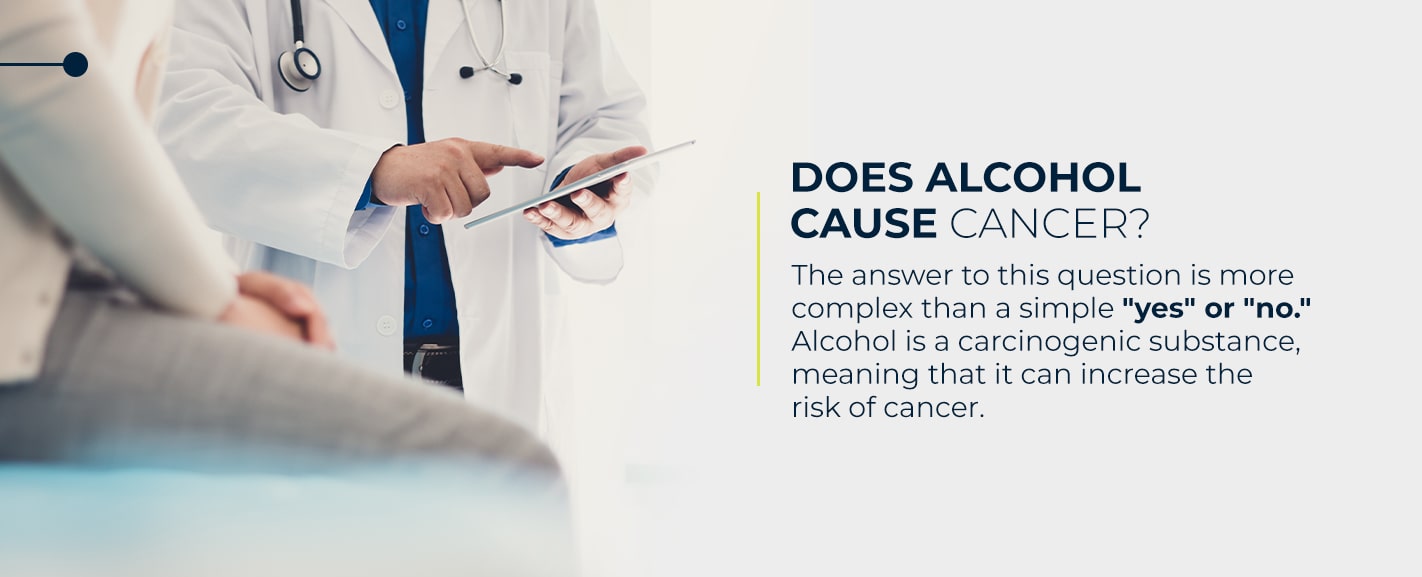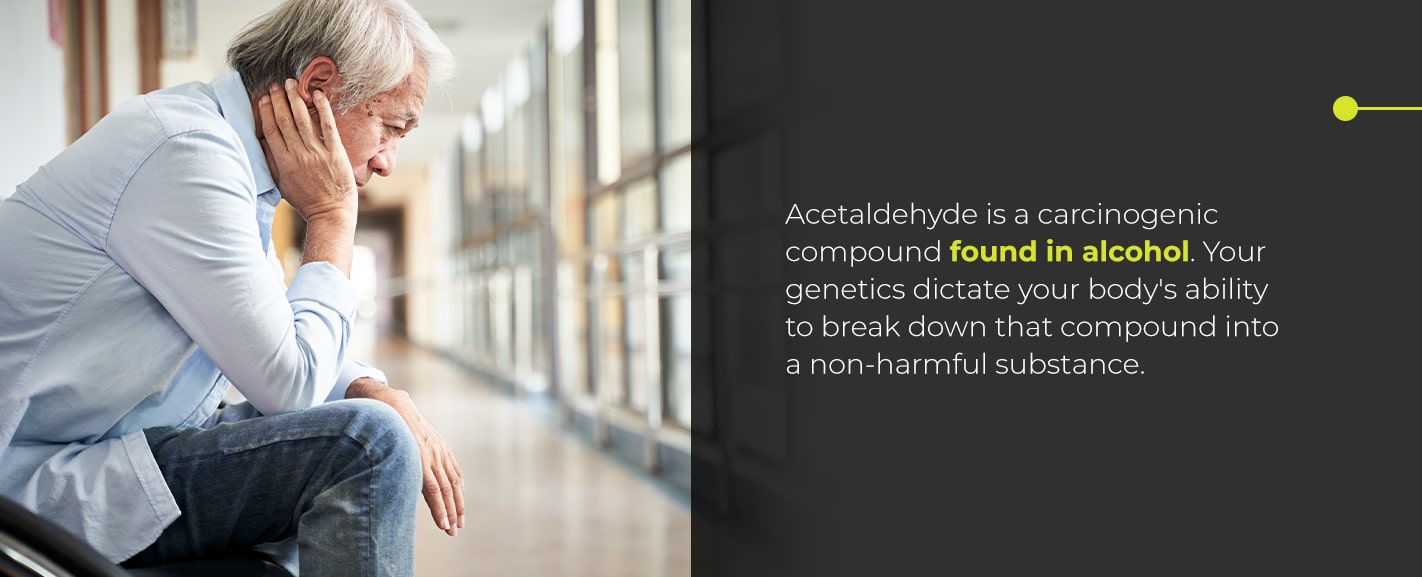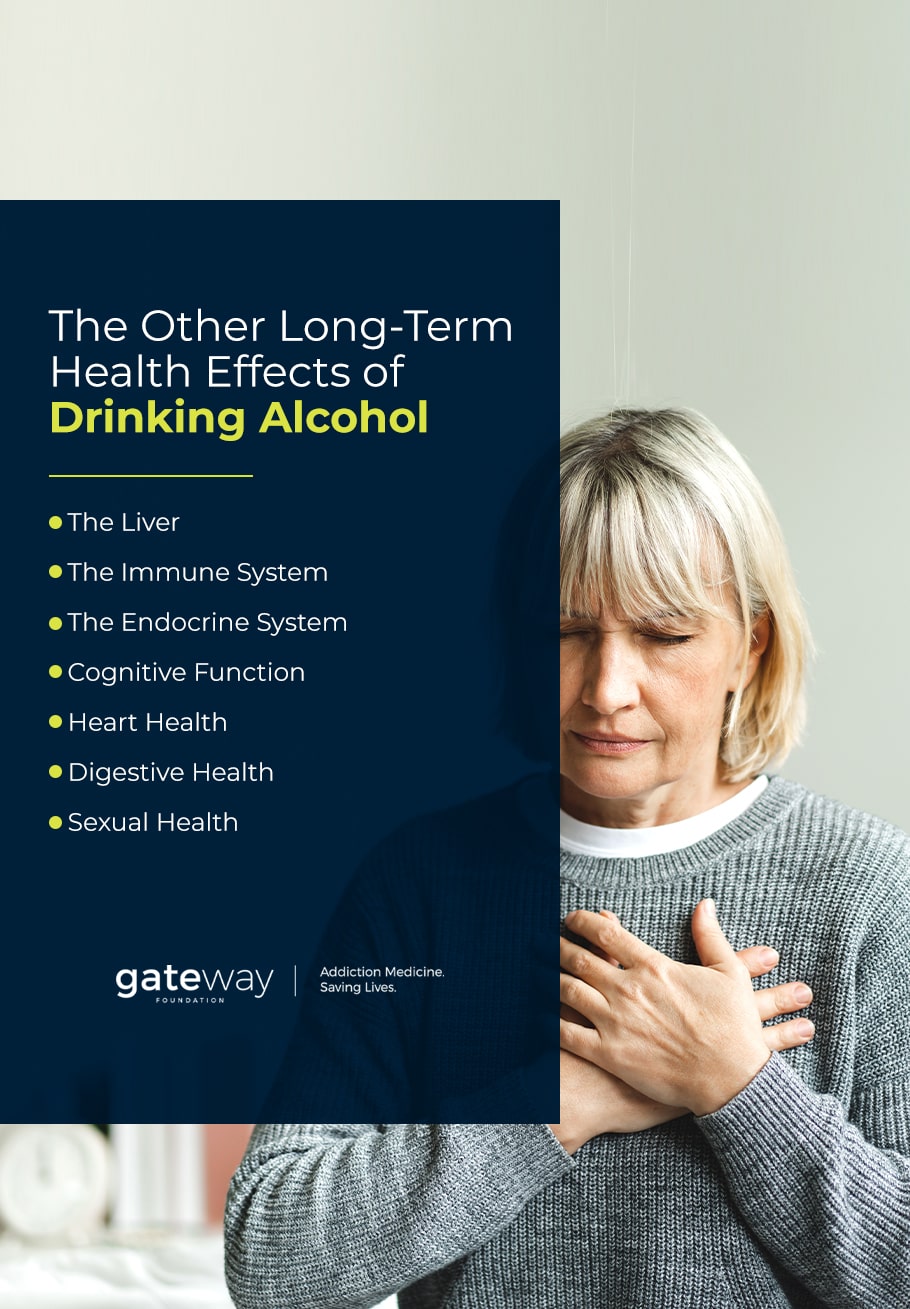- Oct 22
- Drug Addiction Treatment
Alcohol abuse has well-documented effects on a person’s health and well-being. Heavy drinking can increase the risk of accident and injury, damage the liver over time, affect the brain and destroy relationships. Despite these well-known facts, drinking is a normalized – and even sometimes expected — part of life.
While moderate drinking is common, this habit can develop into alcohol abuse, which can lead to numerous health issues. Many individuals know that problems like drunk driving and liver damage are often consequences of alcohol abuse. However, other concerns can stem from these habits, which can be more severe than you realize.
Does drinking cause cancer? There are certain health risks associated with alcohol abuse, including cancer, but you or a loved one always has the opportunity to ask for help and make a change. Take a closer look at the relationship between alcohol and cancer while you decide what comes next.
Does Alcohol Cause Cancer?
The answer to this question is more complex than a simple “yes” or “no.” Alcohol is a carcinogenic substance, meaning that it can increase the risk of cancer. That said, the relationship between drinking and cancer is complex. Just because someone abuses alcohol doesn’t mean they’ll get cancer. Many variables come into play, but the bottom line is that abusing alcohol may put you at risk.
There are several different ways drinking alcohol can increase the risk of cancer, including:
- Metabolizing ethanol: Your body must break down any drinks you ingest. Ethanol, a component of alcoholic beverages, is a carcinogen. When the ethanol breaks down in your body, it becomes acetaldehyde. Acetaldehyde can damage DNA and interfere with the body’s ability to repair that damage. Cancerous cells can take advantage of this situation and begin growing.
- Affecting hormone levels: Alcohol can affect hormone levels in the body. For example, drinking alcohol can increase estrogen levels, which is related to breast cancer and ovarian cancer.
- Interfering with nutrient absorption: Alcohol impacts the body’s ability to absorb various vital nutrients. The deficiency of vitamins, such as vitamin A, vitamin B complex, vitamin C, vitamin D and vitamin E, can increase the risk of developing certain cancers.
- Contributing to weight gain: Alcohol is full of “empty calories,” which means it contains calories that provide no nutritional value. Drinking alcohol simply adds to your daily calorie count. Over time, drinking can contribute to weight gain and obesity. Obesity is associated with the risk of endometrial cancer, liver cancer, kidney cancer, gallbladder cancer, pancreatic cancer and multiple myeloma.
What types of cancer are associated with alcohol?
- Mouth cancer: Drinking alcohol can increase the risk of developing cancer in the mouth. This type of cancer can affect various parts of the mouth, including the lips, tongue, gums, cheeks and roof or floor of the mouth.
- Throat cancer: Alcohol can also play a role in the risk of throat cancer. This type of cancer can be classified as pharynx cancer, affecting the throat, or larynx cancer, affecting the voice box. The risk of pharynx cancer is higher in drinkers than in non-drinkers and increases if you smoke cigarettes.
- Esophageal cancer: The esophagus is the tube food passes through on the way from your mouth to your stomach. Drinking at any level can increase the risk of esophageal squamous cell carcinoma. The risk becomes higher with heavy drinking.
- Stomach cancer: Stomach cancer, also known as gastric cancer, is another potential risk of alcohol consumption. As an example, men who drink more than four alcoholic beverages per day are 65% more likely to get this kind of cancer.
- Colorectal cancer: Heavy drinking is associated with a higher risk of colorectal cancer, which affects any part of the large intestine. This type of cancer, also known as bowel cancer, begins as small growths known as polyps. It’s possible to reduce the risk of colorectal cancer by cutting back on drinking or quitting the use of alcohol entirely.
- Breast cancer: Drinking can increase estrogen in the body, which can increase the risk of hormone-receptor-positive breast cancer.
Does the Type of Alcohol Matter?
There’s a link between alcohol and cancer — but does that relationship change depending on the type of alcohol you drink? The answer is no. Even though various drinks taste different and have different amounts of alcohol in them, they’re still alcoholic beverages. All alcohol is considered carcinogenic and can increase the risk of cancer. It doesn’t matter if the people affected are drinking wine, beer, cocktails or liquor.
What matters most is the amount of alcohol you drink. While no amount of alcohol is entirely risk-free, the danger of developing cancer is typically not as high for moderate drinkers as it is for heavy drinkers. The Dietary Guidelines for Americans recommends different guidelines for alcohol consumption — women should have one drink or less per day, while men should have two beverages or less per day.
Though drinking alcohol comes with health risks, different drinks have different amounts of alcohol in them. Knowing the alcohol by volume in different drinks can help determine the size of a standard drink and what constitutes drinking in moderation. In the U.S., one standard alcoholic drink is as follows:
- Five fluid ounces of wine contains around 12% alcohol content
- Eight to nine fluid ounces of malt liquor contains around 7% alcohol content
- 12 fluid ounces of beer contains around 5% alcohol content
- 1.5 fluid ounces of distilled spirits contains around 40% alcohol content
The actual serving sizes for alcoholic drinks can vary widely, whether you’re served at a bar or restaurant or making drinks at home. It can be easy to lose track of how much you’ve had to drink when you’re in certain situations. If you’re drinking distilled spirits, you’ll consume more alcohol faster than if you’re sipping on beer or wine.
Genetics and the Risk of Alcohol-Related Cancers
Genetics can play a significant role in determining a person’s risk of certain health conditions. There’s even a genetic component involved in addiction and whether you’re at risk for alcohol abuse. Other conditions, like anxiety and depression, are often accompanied by substance misuse disorders. For some people, their genetics may put them at a higher risk for alcohol-related cancers.
Acetaldehyde is a carcinogenic compound found in alcohol. Your genetics dictate your body’s ability to break down that compound into a non-harmful substance. Some people have genes that cause greater production of enzymes responsible for breaking alcohol down into acetaldehyde. At the same time, they have don’t have as many enzymes that break down the acetaldehyde, making it so the carcinogenic substance can build up in the body.
For some people, this process will cause unpleasant sensations, like heart palpitations and a flushed face. These feelings may be enough to deter some people from drinking, while others may continue to drink despite these sensations.
Many people of East Asian descent carry these genes. One gene may speed up the conversion of alcohol to acetaldehyde while the other codes for an ineffective form of the enzyme that metabolizes the acetaldehyde. This particular genetic expression comes with a higher risk of various cancers, including mouth, throat, esophagus and breast cancer.
Additionally, breast cancer has a well-documented relationship with genetics. Approximately 5 to 10% of breast cancers are considered hereditary. If a woman has a family history of breast cancer, drinking can increase the risk of developing that type of cancer. That’s because drinking can increase the amount of estrogen in the body, which may increase the risk of breast cancer.
Cancer Risk — Combining Alcohol and Tobacco Use
By itself, alcohol increases the risk of cancer in multiple places in the body. Similarly, tobacco has a well-known risk of cancer. Smoking tobacco products, like cigarettes, is associated with approximately 90% of lung cancer cases. Cigarettes have dozens of different carcinogens. Smoking is not the only kind of tobacco that increases the risk of cancer, as chewing tobacco also carries a risk of developing cancer of the mouth and throat.
If you’re wondering about alcohol and cancer cells, it’s essential to consider how another substance like tobacco can play a role in health risks. Smoking and drinking are often dual habits, but tobacco use is also known to increase the risk of certain types of cancers. When combined, tobacco and alcohol can amplify the risk to your health.
When a person smokes and consumes alcohol, oral cancer becomes a significant concern. Tobacco or alcohol on their own can play a role in developing cancer of the mouth, throat or esophagus. The harmful effects of both play off one another, leading to a higher risk of developing those specific types of cancer.
While drinking alcohol, you can experience a dehydrating effect. As you consume alcoholic beverages, the tissue in your mouth becomes more susceptible to the dangerous substances in the cigarette smoke or the chewing tobacco you use. Those carcinogens can penetrate your mouth more easily, affecting those cells and increasing the risk of developing oral cancer. Research has found that most oral cancer patients have used tobacco and alcohol simultaneously.
While it’s important to understand the risks of smoking and drinking, it’s also essential to know how you can address those risks. The cessation of smoking and drinking can reduce your risk of developing oral cancer, as well as other types of cancer. That risk does not disappear immediately. Instead, it diminishes over the alcohol- and smoke-free years. The sooner you quit, the sooner you can start to decrease the associated health risks.
The Other Long-Term Health Effects of Drinking Alcohol
Those who drink heavily for years can experience health effects outside of cancer. These habits harm various parts of the body — and the concerns you may experience can be impossible to reverse. Here’s a look at other long-term health effects of alcohol abuse.
1. The Liver
The damage drinking can do to the liver is perhaps one of the most well-known risks of alcohol abuse. Potential risks include the following:
- Cirrhosis is the most severe form of liver damage due to drinking. It causes scarring of the liver, and the damage is typically nonreversible. People with cirrhosis are at risk of liver failure, requiring a transplant.
- People can acquire hepatitis in several different ways. Alcoholic hepatitis occurs when excessive drinking causes inflammation of the liver.
- Fatty liver disease is the least severe liver condition related to alcohol abuse. It causes a buildup of fat around the organ. In many cases, the condition can resolve when a person stops drinking alcohol.
2. The Immune System
Drinking alcohol, especially in excess, harms the body’s immune system. Over time, alcohol will damage cells that play an essential role in the immune system’s response. As a result, it becomes more difficult to fight off infections. For example, alcohol abuse can make people more prone to lung diseases, such as pneumonia and tuberculosis.
3. The Endocrine System
Long-term alcohol abuse has a widespread effect on the body, impacting multiple different organ systems. When alcohol abuse affects the endocrine system, it can cause an inflammatory response in the pancreas. This condition, known as pancreatitis, can have many consequences. This organ is responsible for producing insulin. When drinking impairs that ability, the damage may be severe enough to lead to Type 2 diabetes. Diabetes, which affects blood sugar levels, is a serious chronic health condition that requires treatment. Excessive drinking can become even more dangerous when a person has diabetes.
4. Cognitive Function
In the short term, heavy drinking can cause memory loss, commonly known as “blackouts” or “brownouts.” Over time, the effects on cognitive functioning can become even more severe. Alcohol abuse can affect the ability to concentrate, making learning more complicated, and lead to more severe, lasting memory loss. Years of alcohol abuse can even lead to brain damage. Different areas of the brain may shrink, and it’s possible to develop a type of dementia related to alcohol abuse.
5. Heart Health
Alcohol addiction can lead to cardiovascular disease. For example, long-term alcohol abuse has been linked to cardiomyopathy, which affects the heart muscles. Heavy drinking can also lead to obesity, high blood pressure, peripheral artery disease, stroke and heart failure.
6. Digestive Health
Vomiting after binge drinking is common. While some people may rarely or never experience this system, those who chronically abuse alcohol may frequently vomit due to drinking, causing damage to the throat and mouth. Chronic alcohol abuse can cause other digestive issues like acid reflux and lead to inflammation in other areas of the digestive tract. Heavy drinking can increase the risk of stomach ulcers, affecting how your stomach produces acid. The body may struggle to destroy harmful bacteria that enter your stomach, allowing that bacteria to enter the small intestine.
7. Sexual Health
A single episode of heavy drinking can affect the sexual health of both men and women. Over time, alcohol abuse can contribute to erectile dysfunction. In women specifically, alcohol abuse can affect menstrual cycles and fertility. If you’re actively trying to conceive, drinking alcohol increases the potential risk of miscarriage, stillbirth, premature birth and fetal alcohol syndrome.
Alcohol Use During and After Cancer Treatment
What happens if you’re diagnosed with cancer? Do you need to stop drinking immediately? Does continued drinking affect your treatment and your prognosis? The answers to these questions will be specific to your case and your doctor’s directions. If your cancer can be linked to alcohol abuse, there’ll be little question about your physician’s medical recommendation — drinking has harmed your health, and you should stop.
When undergoing chemotherapy to treat cancer, many people experience side effects, such as nausea, dehydration and mouth sores. These side effects can worsen when combined with alcohol. Additionally, different drugs involved in the chemotherapy regimen can interact adversely with alcohol.
Your doctor may also prescribe you other medications to help treat your cancer and manage the side effects of chemotherapy. Prescriptions such as antidepressants, anxiety medication and sleeping pills are almost always prescribed with instructions to abstain from drinking alcohol. If you’re looking for ways to cope with your diagnosis and treatment, alcohol isn’t the answer. It could interfere with your treatment or put you at risk for developing or worsening alcohol dependence.
Beating cancer is fantastic news, but the same health risks associated with alcohol still apply. Heavy drinking and alcohol misuse carry the risk of causing further health problems in the future, such as recurrence of your cancer or a different kind of cancer. Removing alcohol from your life will put you in a position for a healthy future.
Getting Help at Gateway Foundation
Learning more about the potential health risks connected to alcohol abuse can be challenging when you or a loved one struggles with addiction. However, breaking that cycle of addiction is a powerful way to start addressing those concerns and beginning to rebuild your health.
At Gateway Foundation, we work with you to build an evidence-based treatment plan to beat your addiction. The road to addiction is different for everyone — and so is the road to recovery. We treat each person with an individual approach to find what works best for their situation.
Once you’ve completed the first leg of your journey and overcome your addiction, we stay with you to offer support into the future. Living a substance-free life is rewarding, but that doesn’t mean challenges don’t exist. To ensure you get over potential obstacles, we’re here to help you build the tools to maintain sobriety. If you or a loved one needs help with alcohol abuse, you can contact us to start your journey to a healthier life today.






